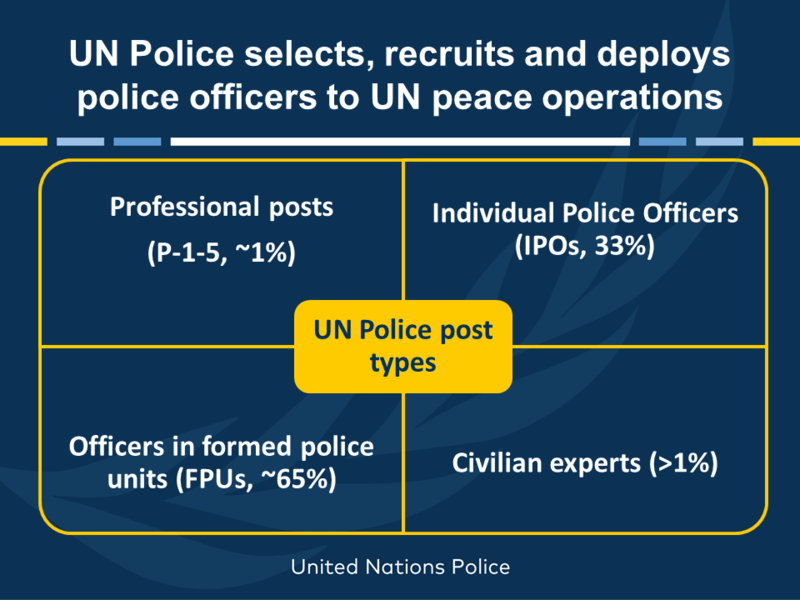Two ways to become a UN Police Officer
United Nations police officers are seconded or loaned by their governments to serve the United Nations for a limited period of time (six months to four years).
If you are interested, you must consult your own police service on how to apply through your government. The United Nations Police Division works closely with Permanent Missions to the United Nations to find the skilled officers required by mission mandates. The process of being nominated by your service and government varies from country to country and the type of position you are interested in.
The second, more limited way that the United Nations Police Division seeks staff is through professional posts. These are published on the United Nations Careers portal. Interested police officers should periodically look at these sites to see what positions may be available.
More Female Police Officers
A top priority for UN Police is to increase the number of female police officers in peacekeeping operations and encourage the recruitment of women in domestic police services.
Only ten percent of UN Police Officers are female, an increase from six percent in 2006, but still a marked imbalance. In August 2009, the UN launched a world-wide drive to recruit more women into its ranks - see United Nations police gender inititatives.
Career Benefits
Police officers working in United Nations missions enhance their professionalism through exposure to standards of excellence in international policing and specialized training. Many senior members of the international policing community consider it beneficial that officers have had an international posting. It is also an opportunity for police officers to help populations in need following a crisis or war. Police-contributing countries see clear benefits for their local communities when their police officers return from UN missions. Many police officers serve in more than one United Nations mission throughout their careers.
Working in United Nations peace missions gives you an opportunity to meet people from many different backgrounds and cultures and to learn from them. Police peacekeepers participate in different mission trainings and often work closely with police from the nation where the mission is located, advising, mentoring and assisting them in their duties. Police peacekeepers expand their thinking about how to approach police service and often bring useful knowledge back to their service when they return home. Becoming a police peacekeeper is for a finite period of time, ranging from six to 18 months, making it a small hiatus in your national career. Seconded police peacekeepers are paid their salary by their own government and receive a mission allowance from the United Nations to cover all of their costs while deployed.
The United Nations is in need of specialized, highly qualified and motivated police officers. If you are interested please contact your national authorities.
What are the job categories for police officers?
UN police officers are authorized by the United Nations Security Council to serve in peacekeeping operations and Special Political Missions to implemented the mandated policing tasks. Approximately 13,000 officers are provided by almost 100 police contributing countries, serving the UN as:
- Individual Police Officers (IPO): About one third of police officers are nominated by their government to serve the United Nations for a period of up to two years. IPOs are seconded or loaned national police officers and continue to receive their national salary, while the UN pays a daily Mission Subsistence Allowance (MSA).
- Formed police Units (FPUs): About two thirds of all police are deployed as a trained and equipped, cohesive unit. The Member State is responsible for the payment of any emoluments, allowances and benefits owed to its personnel, while the UN reimburses the Member State for the FPU personnel and equipment during the period of assignment to the mission.
- About hundred officers (1 percent), serve on professional posts as temporary staff members of the United Nations, in peacekeeping operations, Special Political Missions and at the Police Division in New York and the Police Division’s Standing Police Capacity in Brindisi, Italy. Officers on professional posts can be seconded by their government for a period up to four years or, if required, recruited as civilian experts. Professional posts are fully paid by the UN. Senior positions in police components in field missions, such as the Head of the police component (at P-5 to D-2 level), are usually employed on professional posts.
- Police components also recruit about two dozen civilian experts with specialised skill sets. They can be recruited, similarly to Individual Police Officers, nominated/ loaned by a member state or on professional posts.
The requirements for officers and the application and deployment procedures differ significantly based on each job category. Therefore, the website is divided by contractual status of personnel deployed.
Structure at HQ
The Police Division has standardized the selection and recruitment processes and procedures for both individual police officers and formed police units and to recruit senior police personnel, while assuring geographic, linguistic and gender balances in close cooperation with Member States.
*Please note: The United Nations, including the Police Division, does not charge a fee at any stage of the recruitment process (application, interview meeting, processing, training or any other fees). The United Nations does not concern itself with information on bank accounts.


